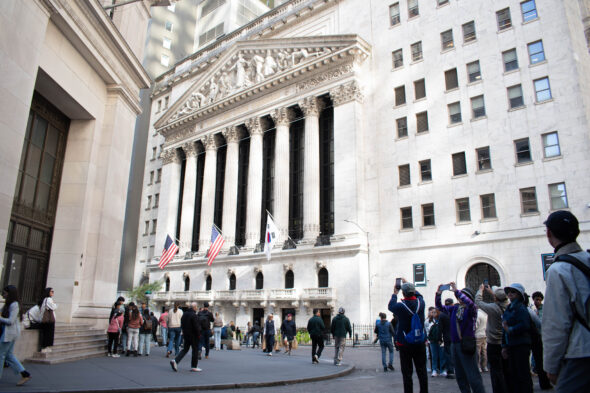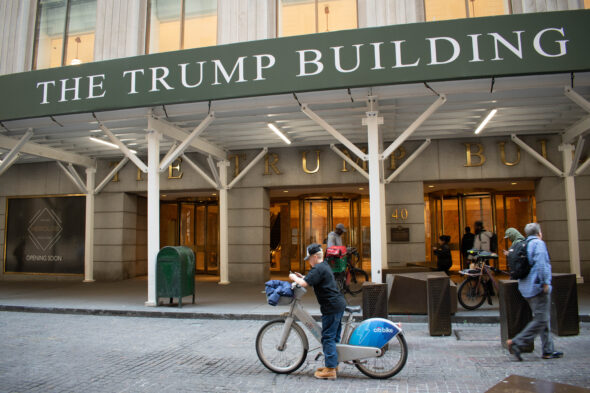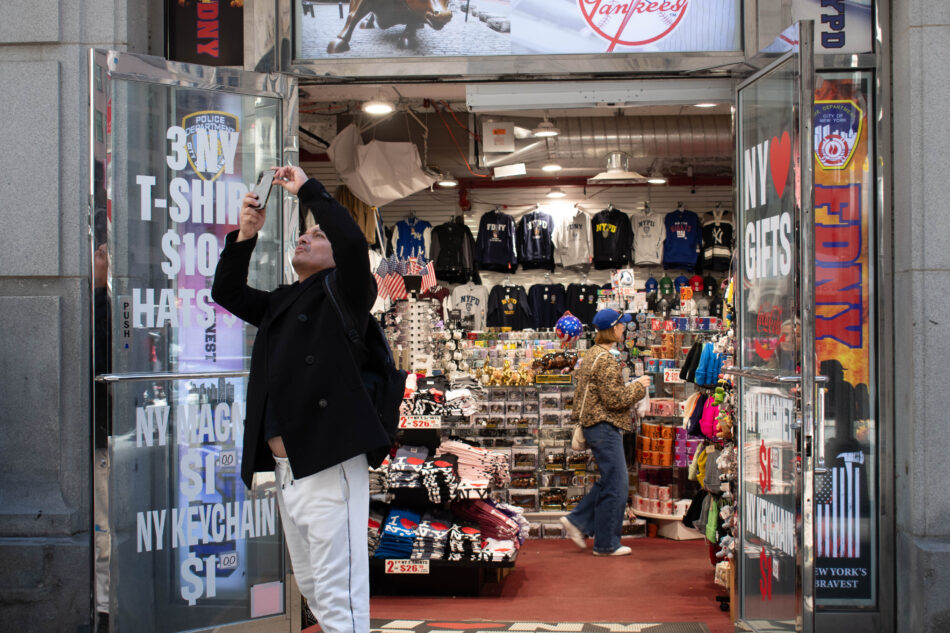Harry Kona, an employee of the “I Love NY” gift shop on Broad Street, across from the New York Stock Exchange, had only a few customers to greet just after 6 p.m.. It was a Wednesday in early October, a few weeks past the peak of the summer travel season.
The store’s target market of tourists had now been overshadowed by “native Americans,” Kona said. The most talked-about item in the shop was no longer the iconic “I love NY” graphic hoodies or t-shirts that hung on the racks of the store’s walls.
With just over one month until the election, political merchandise has been flying off the shelves. The store carries shirts, bobbleheads of current and former presidential candidates, and the iconic red “Make America Great Again” hat — a staple of former President Donald J. Trump’s campaign.
Kona pointed at the top of a column in the middle of the store. There hung two t-shirts, $25 each: a black shirt with a United States flag and the headshot of Vice President Kamala Harris; and a white shirt, with the foreboding image of Trump raising his fist after being shot during his July 13 rally in Butler, PA. There were several Harris shirts in stock. There were only three of Trump.
The election has impacted the lives of working Americans in different ways, depending on the industry. For retail employees like Kona, it has caused a stir in the shop he works in, even though he doesn’t side with either candidate. For others, the election has only impacted their lives on a personal level. Some will actively try to keep politics out of the workplace.
“The Trump merchandise,” said Kona. “They will be selling more.
“Some people go crazy over Trump,” he added, explaining that he rarely saw people buying Harris shirts.
Kona said that the shop has tried to stock merchandise of both candidates. But once or twice a week, he said, supporters of one candidate will question the shop’s choice to carry both candidates’ merchandise.
“If it is a Trump supporter,” Kona said. “‘Why are you having the Kamala Harris t-shirts and merchandise? You should not have that.’”
The “native Americans” making these comments, according to Kona, are mainly from Texas, Boston and Michigan, a swing state.
It was also a turbulent time for global politics. The wake of the air strikes in the Middle East, and Israel’s looming response, hung over global news networks, though this didn’t impact the work of Kona or many others in the area.

(Photo by Sofie Kato.)
For some, the ongoing conflict in the Middle East and the election had minimal impact on their professional lives.
Neil Raymond, an ICSC employee who was waiting for a friend at the corner of Wall Street and William Street, said he didn’t foresee the Middle East Crisis or the election affecting his work in any way. ICSC rents public spaces, he said, but the company hasn’t had any issues with controversial events like protests in these spaces.
“I think people just don’t want to offend anybody,” said Raymond, who added that he did not know who he was voting for. “Probably in private conversations.”
On the patio of Traditas Pizza on Maiden Lane, a few employees of a skincare company were gathered for a work happy hour. They declined to say which brand, but said that it was a global company.
The Middle East Crisis and the election had not affected the skincare industry, but the Russia-Ukraine War did, according to one of the employees who declined to provide her name. They faced massive supply chain issues. A lot of their goods were delayed.
Another employee of the company, Sarah Thompson, said that even though the conflict didn’t affect their industry, it was frustrating that she couldn’t have conversations about it with her colleagues.
“We just, as a company, don’t really broach those subjects, which is fine for our working relationship, but it doesn’t allow for a lot of thinking, from that perspective, which is a little bit frustrating,” said Thompson, who added that she didn’t want to bring up politics at her work happy hour, despite it being a significant global event.
Thompson said that she’s taken more steps to become “an active citizen” in her personal life. She submitted her absentee vote early, because she votes in a different state. Among her family and close friends, she said she’s been “feeling out the temperature to see if we’re striking against the same things.”
In the election, Thompson said she would be voting for Harris. She said she doesn’t agree with all of Harris’ policies, but felt that American politics were in a place where insults and tactics — not policies — were taking the limelight of the election.
“I’m eager to get back to a place where, when we talk about parties, it’s about principle and policy and not about insults,” Thompson said. “I’m really, really ready to get back to that. And I see Harris–Walz as a way to get back to that.”

The Trump Building on Wall Street. (Photo by Sofie Kato.)
Around the corner from the souvenir shop where Kona worked, outside of The Trump Building on Wall Street, Jason Labarbera, the owner of Gotham Capital, leaned against a metal barrier as he smoked. He said he hadn’t been looking at the news, but through Instagram learned about the situation in the Middle East.
Did he think the air strikes would affect the markets?
“Nah, not that,” Labarbera said. “I think what’s gonna affect the markets more is the strike that’s going on in the ports, to be honest.
“Yeah, the air strikes … I don’t know. War is profitable.”
Labarbera explained that wars are profitable for manufacturers of equipment and ammunition. “Military stuff,” he put it.
And Labarbera knew who he would be voting for. He pointed at Trump’s name, printed in large gold letters on the building in front of him.
“I mean, that’s my landlord,” he said.



